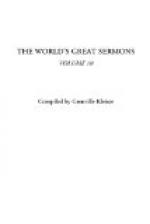He contrasts it with eloquence. And what a noble gift it is, the power of playing upon the souls and wills of men, and rousing them to lofty purposes and holy deeds. Paul says, “If I speak with the tongues of men and of angels, and have not love, I am become as sounding brass, or a tinkling cymbal.” And we all know why. We have all felt the brazenness of words without emotion, the hollowness, the unaccountable unpersuasiveness, of eloquence behind which lies no love.
He contrasts it with prophecy. He contrasts it with mysteries. He contrasts it with faith. He contrasts it with charity. Why is love greater than faith? Because the end is greater than the means. And why is it greater than charity? Because the whole is greater than the part. Love is greater than faith, because the end is greater than the means. What is the use of having faith? It is to connect the soul with God. And what is the object of connecting man with God? That he may become like God. But God is love. Hence faith, the means, is in order to love, the end. Love, therefore, obviously is greater than faith. It is greater than charity, again, because the whole is greater than a part. Charity is only a little bit of love, one of the innumerable avenues of love, and there may even be, and there is, a great deal of charity without love. It is a very easy thing to toss a copper to a beggar on the street; it is generally an easier thing than not to do it. Yet love is just as often in the withholding. We purchase relief from the sympathetic feelings roused by the spectacle of misery, at the copper’s cost. It is too cheap—too cheap for us, and often too dear for the beggar. If we really loved him we would either do more for him, or less.
Then Paul contrasts it with sacrifice and martyrdom. And I beg the little band of would-be missionaries—and I have the honor to call some of you by this name for the first time—to remember that tho you give your bodies to be burned, and have not love, it profits nothing—nothing! You can take nothing greater to the heathen world than the impress and reflection of the love of God upon your own character. That is the universal language. It will take you years to speak in Chinese; or in the dialects of India. From the day you land, that language of love, understood by all, will be pouring forth its unconscious eloquence. It is the man who is the missionary, it is not his words. His character is his message. In the heart of Africa, among the great lakes, I have come across black men and women who remembered the only white man they ever saw before—David Livingstone; and as you cross his footsteps in that dark continent, men’s faces light up as they speak of the kind doctor who passed there years ago. They could not understand him; but they felt the love that beat in his heart. Take into your new sphere of labor, where you also mean to lay down your life, that simple charm, and your life-work must succeed. You can take nothing greater, you need take nothing less. It is not worth while going if you take anything less. You may take every accomplishment; you may be braced for every sacrifice; but if you give your body to be burned, and have not love, it will profit you and the cause of Christ nothing.




